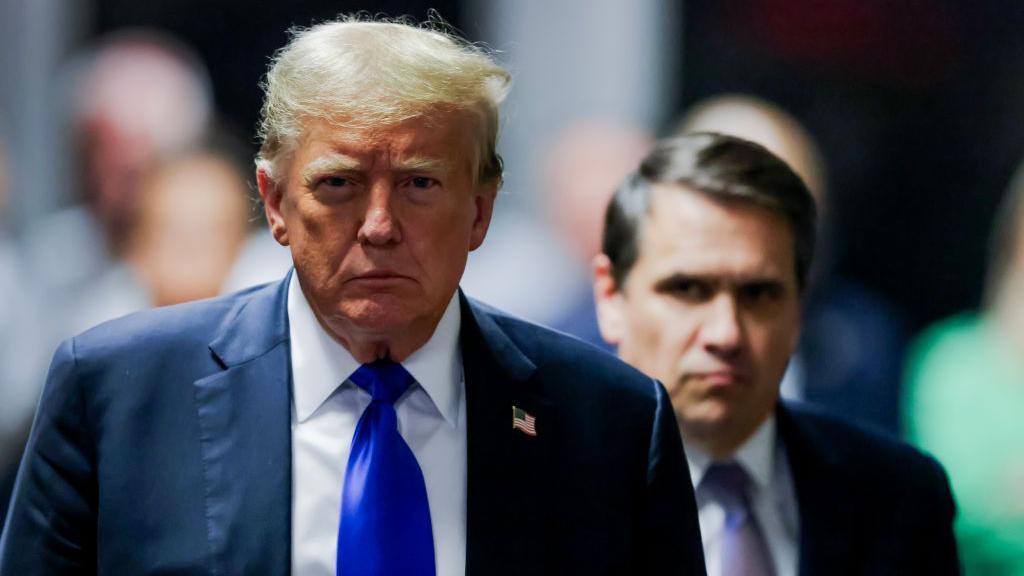Trump's criminal sentencing delayed until after election

Trump was found guilty of 34 felony counts in May
- Published
Donald Trump's sentencing in his Manhattan hush money criminal trial has been postponed until after the November election.
Judge Juan Merchan on Friday delayed the sentencing to 26 November, citing "the unique time frame this matter currently finds itself in" among his reasons.
Lawyers for Trump, the Republican presidential candidate, have used several legal manoeuvres to delay the sentencing, which had been scheduled for 18 September.
A New York jury in May convicted Trump on 34 felony counts of falsifying business records, the first time a sitting or former president has been convicted of a crime.
In his decision, Judge Merchan wrote that the case demands "a sentencing hearing that is entirely focused on the verdict of the jury".
"Their verdict must be respected and addressed in a manner that is not diluted by the enormity of the upcoming presidential election," he said, setting sentencing to exactly three weeks after the 5 November election.
He said the delay was necessary "to avoid any appearance - however unwarranted - that the proceeding has been affected by or seeks to affect the approaching presidential election in which the Defendant is a candidate”.
“The Court is a fair, impartial and apolitical institution,” the judge continued.
Trump could face a sentence of up to four years in prison, but Judge Merchan also has the discretion to impose a punishment of a fine, probation or a shorter jail term.
Prosecutors in the case accused the former president of concealing a payment to buy the silence of Stormy Daniels, a former adult-film star, in the final days of his 2016 election campaign.
Ms Daniels testified that she and Trump had sex, and that she accepted $130,000 (£99,000) from his former lawyer before the 2016 election in exchange to keep quiet about the encounter.
Prosecutors argued that, by approving a scheme to disguise the money as legal expenses, Trump broke the law.
A jury found him guilty on all counts.
Trump's original sentencing date was in July. His lawyers delayed that after a US Supreme Court ruling that granted presidents some immunity from criminal prosecution for "official acts".
Judge Merchan granted a delay so that the parties could prepare arguments on the effects of the Supreme Court ruling on his case.
A decision on the implications will come on 12 November.
Judge Merchan has already dismissed some arguments made by Trump's lawyers to delay as "unsubstantiated grievances... that do not merit this Court's attention".
But he wrote that sentencing hearings are routinely delayed in other cases for reasons like personal circumstances or scheduling conflicts.
"Given the unique facts and circumstances of this case, there is no reason why this Defendant should be treated differently than any other," Judge Merchan said.
He added that his decision to delay "should dispel any suggestion" that the court would have made a decision that would be seen in support of "any political party or any candidate for any office".
Trump has maintained that he did nothing wrong. He told Fox News after the ruling that the "case should be dead".
On his social media platform Truth Social, the former president re-iterated his claims of innocence, dismissing the case as a "witch hunt" and a "political attack".
"This case should be rightfully terminated, as we prepare for the Most Important Election in the History of our Country," he wrote.
A spokesperson for Alvin Bragg, the Manhattan district attorney whose office brought the charges, said his team was "ready for sentencing on the new date set by the court".
If Trump is re-elected US president, he could order the Justice Department to drop the ongoing federal cases against him.
However, this case in New York - as well as the election interference case in Georgia - involved state charges, and a president would not have the authority to interfere.